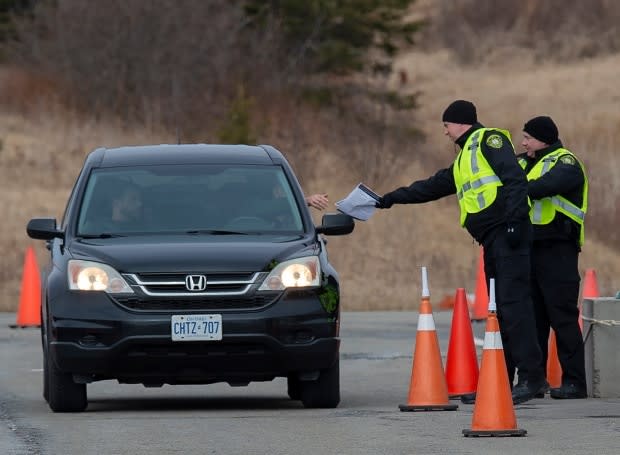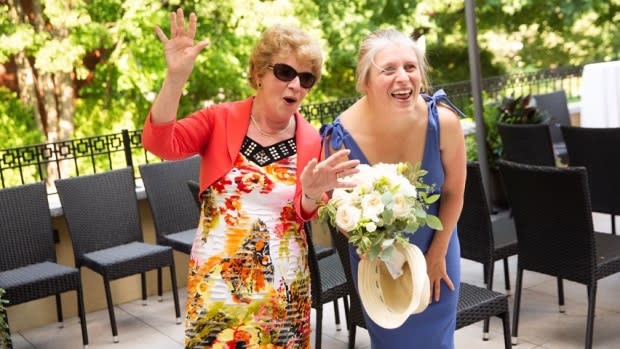Ontario councillor who took New Brunswick road trip claims he stayed in private home
A Peterborough, Ont., city councillor who entered New Brunswick despite COVID-19 border restrictions now says he stayed at the private home of an acquaintance in the province.
Stephen Wright told CBC News Monday afternoon that what he calls a research trip lasted 10 days and he decided to try it because of inconsistent answers from provincial officials about whether he would be admitted to the province.
"I erred on the side that that was information that I needed to find out in doing part of my job and [I] took the necessary precaution that I kept myself safe, and anybody that I ever would have come into contact with, safe as well."
An initial news report in the Peterborough Examiner newspaper described the road trip as lasting a weekend and quoted Wright saying he promised New Brunswick enforcement officers at the border that he would stay in his car during the entire trip.
But Wright told CBC Monday that he was misunderstood when he spoke to the paper about the length of the trip.
And he said he gave the officers an address and a phone number where they could reach him during his stay in the province.
That was at the private residence of an acquaintance who had been working at home for several months, he said.
"I won't reveal where in the province I stayed because it seems there are enough people who want to do some public shaming. But no, I had friends who had made arrangements for a place for me," he said.
"Where I was staying, I had no contact with nobody else there, either," he added. He called it "a separate self-contained unit" apart from his acquaintance with "no shared living area or bathroom."

Wright said he didn't tell enforcement officers at the border that he'd be staying at a private residence where someone was already living because "that question wasn't asked."
Wright is a member of a regional economic recovery task force in the Peterborough area and said he wanted to come to New Brunswick to see how restaurant reopenings were going.
He said Monday he did not enter any New Brunswick restaurants but assessed the success of their openings by looking at how many cars were in their parking lots and drive-thru line-ups.
He said he chose not to check downtown restaurants without parking lots.
Investigation underway
Premier Blaine Higgs said at a media briefing Sunday he wanted to know more about how Wright was allowed into the province, given a ban on non-essential visits.
"It is under full investigation because it does not seem like a legitimate reason to come into the province," he said. "We will evaluate just what questions were asked but more importantly what answers were given."
Public Safety spokesperson Geoffrey Downey said Monday afternoon the investigation is ongoing "and we will be reviewing our records and following up with the City of Peterborough to determine if this was work travel authorized by the City."
Trip not at council's direction
Ashley Webster, a spokesperson for Peterborough Mayor Diane Therrien, said the trip "was not at council's direction or the mayor's direction" and the city didn't pay for it.
Wright confirmed he paid for the trip himself. He said he has sometimes funded his own research into issues to get "the other side of the argument."
The deputy minister at the public safety department, Mike Comeau, said on Twitter Monday afternoon that crossing a border "often involves officers having to decide whether to believe what a person is telling them. It's inherent to border control."
'Beyond disrespectful'
News of Wright's trip frustrated New Brunswickers living elsewhere in Canada who've been trying to get permission to enter the province to visit relatives with life-threatening illnesses or to bury loved ones who have died.
"I'm floored. I can only surmise that somebody decided that this person was important and should be allowed to come in," said Lesley Shannon, a British Columbia resident originally from the Saint John area.
She wants to travel to the province for the burial of her mother Lorraine, who died in April. A house has been rented for her and friends are prepared to drop off groceries so she can heed the rules to self-isolate for 14 days before the burial, she said.
"I think the reasoning [for letting Wright in] is shocking," she said.

Shannon's mother has to be buried by early July because the cemetery does not have cooling in its vault. "We've been told that's a non-negotiable situation."
With a two-week isolation period and the scarcity of flights during the pandemic, she said her window to attend the burial is closing fast.
Yet the province isn't showing her the same flexibility it showed Wright when it let him in to count cars in restaurant parking lots, she said.
"To me it's beyond disrespectful that my mom would have to be buried without me being there when I'm perfectly capable of being there."
Questions about consistency, compassion
Dave Perry, an Ottawa resident originally from New Brunswick whose father is in the oncology unit at the Saint John Regional Hospital with life-threatening leukemia, said he was also stunned to read about Wright's trip.
"I'm just not seeing much consistency in terms of how the province determines who's allowed in, and not much compassion in the compassionate policy," he said.
Both Shannon and Perry said they've been frustrated seeing the province make allowances for temporary foreign workers and university students to enter the province, but not grieving relatives.
"The process for figuring out the process for trying to do this is not good," Shannon said. "It's really terrible, to be honest."
Perry said: "I'm just looking for a mechanism where, if I need to, I can get home to see my family."
Shannon said she could have flown home before her mother's death on April 13 because the province hadn't yet stationed enforcement officers at airports to screen incoming flights.
But she heeded advice not to come and now "it looks like I'm going to pay the price for doing what our provincial and federal government officials begged us all to do."
Wore protective equipment
Wright suggested that New Brunswick's limitations on interprovincial travel are unconstitutional, something that some experts and advocacy groups have also raised. But he said he didn't travel to the province for the sake of making a point.
Wright said he always paid for gas at the pumps and used gloves, N95 masks and hand sanitizer while in New Brunswick.
He said he had contacted business organizations in the province to get information about how the recovery was going but they didn't respond and he decided to travel here himself to see things firsthand.

 Yahoo Movies
Yahoo Movies 
